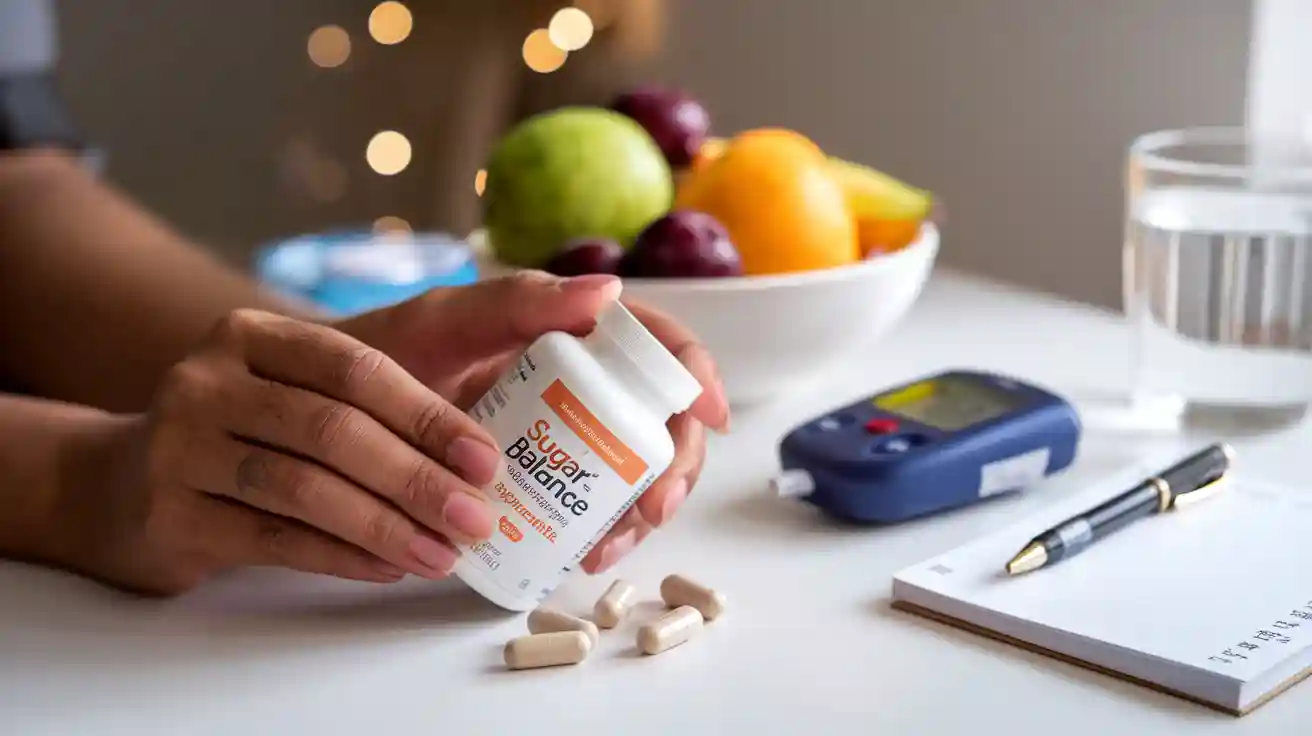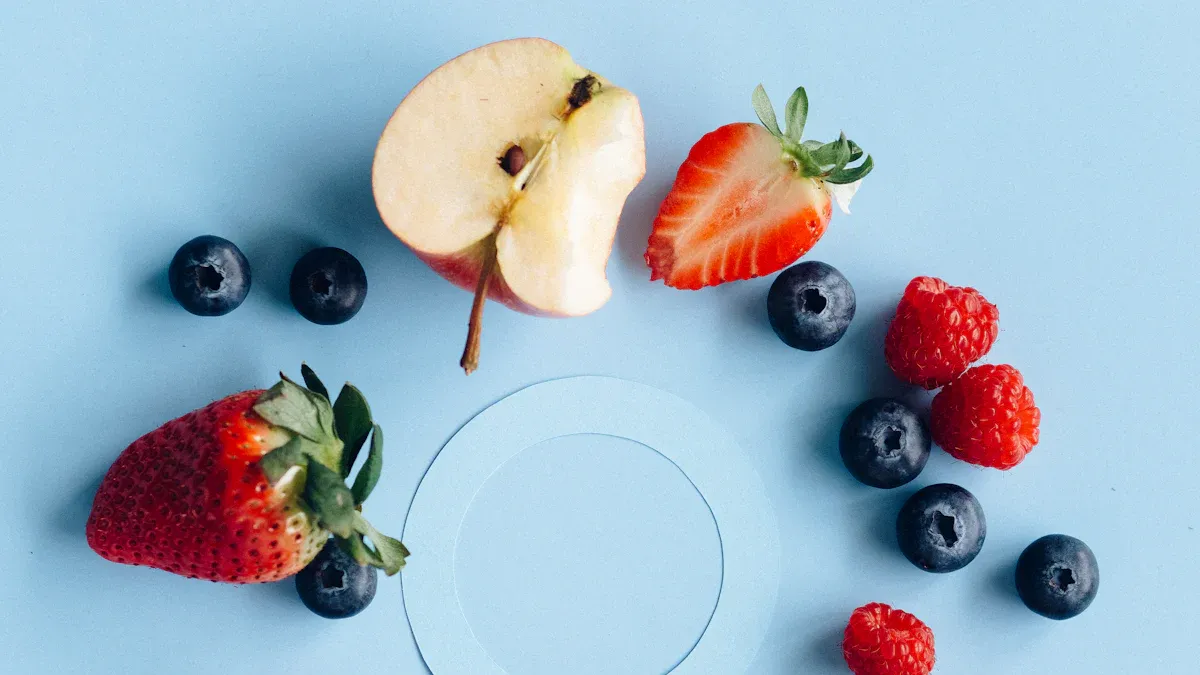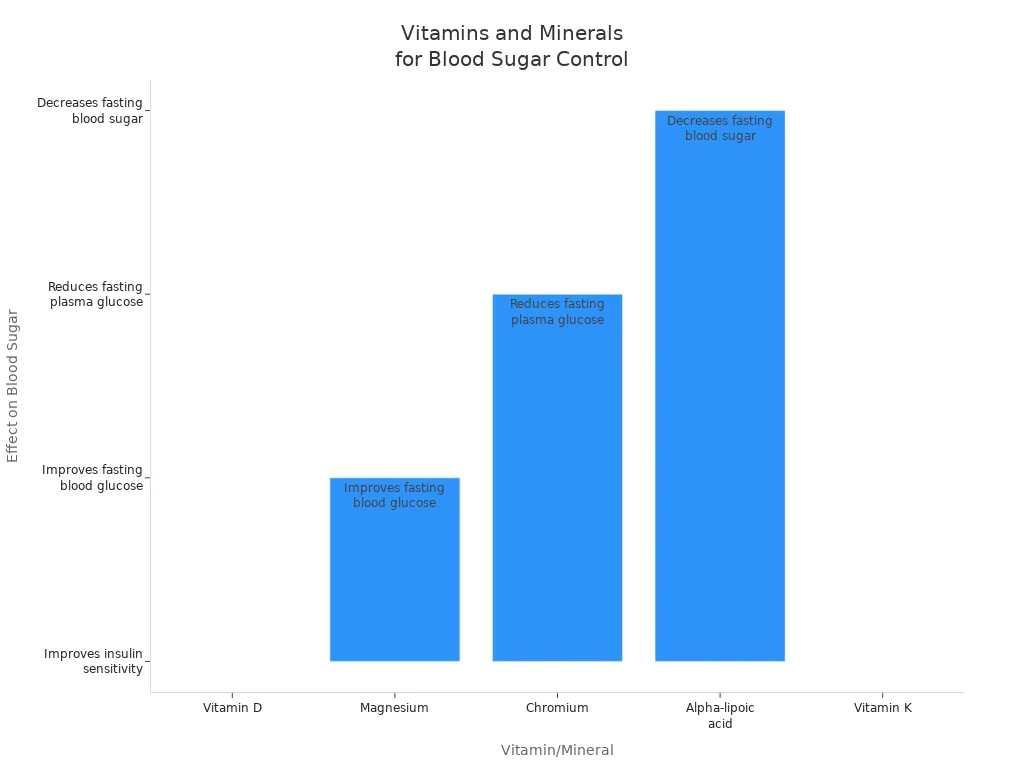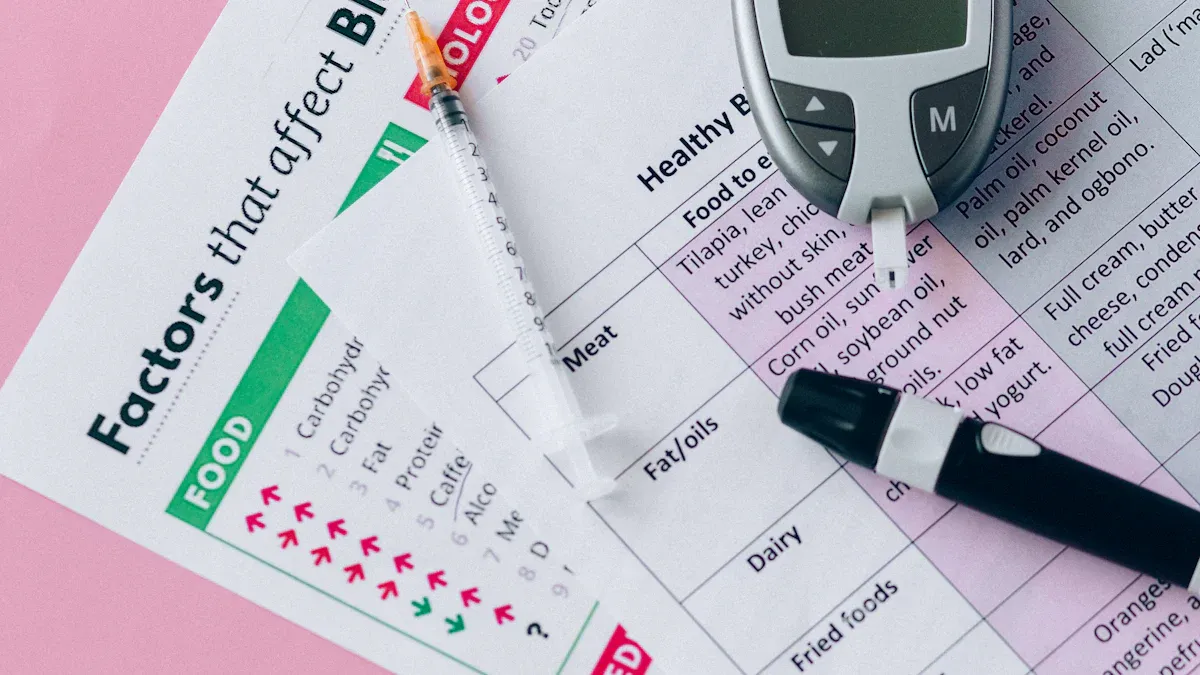How Sugar Balance Supplements Help Manage Diabetes
Table of Contents

You may wonder if sugar balance supplements can help with diabetes control. Many people with diabetes look for natural ways to support their health. Surveys show that up to 70% of adults with diabetes use supplements or alternative medicine. Some supplements, such as those with transglucosidase, chromium picolinate, and cinnamon extract, may help by blocking sugar absorption and helping glucose move into your cells. Studies on type 2 diabetes show these supplements can lower blood sugar after meals. Always remember that benefits and risks exist. Speak with your healthcare provider before adding any supplement to your plan.
Sugar Balance Supplements Overview
What Are Sugar Balance Supplements
You may see many products labeled as sugar balance supplements. These products aim to help you keep your blood sugar in a healthy range. Most sugar balance supplements contain a mix of vitamins, minerals, and plant extracts. Some of the most common ingredients include chromium, magnesium, zinc, bitter melon, gymnema sylvestre, cinnamon, and alpha-lipoic acid. Each ingredient plays a unique role in supporting your body’s ability to manage blood sugar.
Here is a table showing some popular supplements and their roles:
| Supplement | Role in Blood Sugar Management |
|---|---|
| Chromium | Helps stabilize blood sugar and increase insulin sensitivity |
| Magnesium | Supports glucose and insulin regulation |
| Zinc | Improves insulin sensitivity and lowers blood glucose |
| Bitter Melon | Linked to anti-diabetic effects |
| Gymnema Sylvestre | Supports glucose metabolism |
| Cinnamon | May reduce blood sugar and cholesterol levels |
| Alpha Lipoic Acid | Antioxidant that helps with blood sugar control |
Note: The FDA does not approve sugar balance supplements for treating diseases. Always check labels and talk to your doctor before starting any new supplement.
How They Work
Sugar balance supplements work in several ways to help you manage your blood sugar. Some ingredients, like chromium and cinnamon, boost your body’s response to insulin. Others, such as magnesium and alpha-lipoic acid, support glucose metabolism and reduce oxidative stress. Bitter melon and gymnema sylvestre may help your body use sugar more efficiently.
These supplements target different pathways in your body:
- Reduce inflammation to improve insulin sensitivity
- Support gut health for better glucose regulation
- Slow sugar absorption with dietary fiber
- Enhance insulin receptor activity
You should remember that sugar balance supplements do not replace prescribed diabetes medications. They may offer extra support, but you need to use them wisely and under medical guidance.
Key Ingredients for Blood Sugar

Herbal Extracts
You can find many herbal extracts in sugar balance supplements. These natural ingredients have a long history in diabetes management. Some of the most common herbal extracts include:
- Bitter melon
- Milk thistle
- Fenugreek
- Gymnema
Bitter melon may help lower fasting blood glucose levels. Milk thistle can support lower glucose levels, according to some studies. Fenugreek may delay the onset of type 2 diabetes and reduce blood sugar. Gymnema sylvestre is known for reducing blood glucose and curbing sugar cravings.
Researchers have tested herbal extracts in clinical trials. Cinnamon extract has shown positive effects on plasma glucose and HbA1c in people with type 2 diabetes. Over 1200 herbal medicines have been studied for their ability to lower blood sugar and reduce diabetes complications. Nine herbal plants have been tested as possible anti-diabetes drugs.
Tip: Herbal extracts may offer extra support, but you should always check with your doctor before using them.
Vitamins and Minerals
Vitamins and minerals play a key role in blood sugar regulation. You need to get enough of these nutrients to help your body work well. The table below shows how some vitamins and minerals help manage blood sugar:
| Vitamin/Mineral | Effect on Blood Sugar Regulation | Supporting Study |
|---|---|---|
| Vitamin D | Improves insulin sensitivity and decreases risk of type 2 diabetes | Study 1 |
| Magnesium | Improves fasting blood glucose and beta-cell function | Study 2 |
| Chromium | Reduces fasting plasma glucose and insulin resistance | Study 3 |
| Alpha-lipoic acid | Decreases fasting blood sugar and insulin resistance | Study 4 |
| Vitamin K | Improves insulin sensitivity and glucose tolerance | Study 5. |

You should try to get your daily vitamin and mineral needs from food. Some groups, such as older adults or pregnant women, may need supplements. Most people do not need extra vitamins or minerals unless they have a deficiency.
Other Nutrients
Sugar balance supplements often include other nutrients that help your body manage blood sugar. These nutrients work in different ways:
| Nutrient | Proposed Mechanism of Action |
|---|---|
| GlucoAdvantage® Dihydroberberine | Reduces glucose spikes and enhances insulin functioning. |
| Gymnema Sylvestre Extract | Reduces sugar absorption in the gut and curbs cravings. |
| Berberine | Improves insulin functioning and regulates glucose levels. |
| Chromium | Enhances insulin activity and supports healthy glucose metabolism. |
| Biotin | Aids in energy production and helps maintain healthy metabolic function. |
| Trans-Resveratrol | Improves insulin functioning and protects brain health. |
Clinical studies show that nutrients like vitamin D can improve glycemic control. Plant-based diets and lifestyle changes also help lower blood sugar and cholesterol. You can use these nutrients as part of a healthy routine, but always check with your healthcare provider first.
Note: Supplements work best when you combine them with a balanced diet and regular exercise.
Lower Blood Sugar: Effectiveness and Safety

Scientific Evidence
You may want to know if sugar balance supplements really help lower blood sugar. Many studies have tested popular supplements in people with diabetes and high blood sugar. Researchers often look at how these supplements affect fasting blood glucose, post-meal glucose, and A1C levels. These numbers show how well you manage blood glucose control over time.
Here is a table that shows what scientists found in randomized controlled trials:
| Supplement | Effect on Fasting Blood Glucose (FPG) | Effect on Postprandial Glucose (PPG) | Effect on A1C |
|---|---|---|---|
| Berberine | Decrease by 15 mg/dL | Decrease by 34 mg/dL | Decrease by 0.7% |
| Chromium | Decrease by up to 18 mg/dL | N/A | Decrease by up to 0.6% |
| Cassia Cinnamon | Decrease by 25 mg/dL | N/A | N/A |
You can see that berberine, chromium, and cinnamon may help lower blood sugar. In one study, 105 people with type 2 diabetes took 1 gram of cinnamon daily for 90 days. Their fasting blood glucose improved. Another study with 116 people showed that berberine supported healthy glucose metabolism. A review of 16 studies found that cinnamon supplements lowered fasting blood sugar in both type 2 diabetes and prediabetes.
Other nutrients also show promise. Psyllium fiber, vitamin C, zinc, vitamin D, omega-3, and vitamin E all helped reduce A1C in some studies. Probiotics and dietary fiber also lowered A1C and fasting blood sugar. Here is a table with more results:
| Supplement Type | Average Reduction in HbA1c | Average Reduction in Fasting Blood Glucose |
|---|---|---|
| Probiotics | 0.81% | 0.98 mmol/L |
| Dietary Fiber | -0.26% | -85 mmol/L |
These results suggest that some supplements can help lower blood sugar and improve insulin function. However, not all studies agree, and the effects may be small for some people.
Expert Opinions
You may wonder what diabetes experts think about these supplements. The American Diabetes Association says there is not enough strong evidence to support using supplements for glycemic control in people with diabetes who do not have vitamin or mineral deficiencies. They do not recommend supplements as a main way to lower blood sugar.
Some doctors see potential in supplements like berberine for lowering glucose levels. However, they point out that many studies are small or not well-designed. Experts say you need more high-quality research to know if these supplements are safe and effective for everyone.
Note: Always talk to your healthcare provider before starting any supplement, especially if you take insulin or other diabetes medicines.
Risks and Side Effects
You should know that sugar balance supplements can cause side effects and may interact with your diabetes medications. Some supplements, such as berberine and cinnamon, can lower blood sugar too much. This can lead to hypoglycemia, especially if you already use insulin or drugs that lower blood sugar.
Common side effects include:
- Upset stomach
- Diarrhea
- Headache
- Allergic reactions
Supplements like chromium and alpha-lipoic acid may also affect how your body uses insulin. If you take too much, you may experience dizziness or changes in mood. Some herbal extracts can interact with medicines and make them less effective or more powerful.
You should always check with your doctor before adding a new supplement. Your doctor can help you avoid dangerous interactions and monitor your blood sugar closely. If you notice signs of hyperglycemia or hypoglycemia, such as feeling very thirsty, tired, shaky, or confused, seek medical help right away.
Tip: Keep a record of any new supplements you try. Track your blood sugar and insulin doses to spot changes early.
Monitor Your Blood Sugar Levels and Use Supplements Wisely
Practical Tips
You can safely add sugar balance supplements to your diabetes management plan by following a few important steps. Always talk to your healthcare provider before starting any new supplement. Your doctor can help you choose products that fit your health needs. Supplements should support your plan, not replace your medicine or healthy habits.
- Consult with your healthcare provider before starting any new supplements.
- Make sure the supplements you choose match your personal health needs.
- Use supplements as support, not as a replacement for medication or lifestyle changes.
You should monitor your blood sugar levels closely when you begin a new supplement. This helps you spot any changes early. Keep a record of your fasting blood sugar and note any side effects. If you notice big changes, contact your doctor right away.
Combining with Diet and Lifestyle
Supplements work best when you combine them with healthy eating and regular exercise. Research shows that exercise can improve A1C levels in people with type 2 diabetes. You should aim for at least 150 minutes of exercise each week. Try walking, swimming, or cycling. Exercise helps your body use insulin better and keeps your fasting blood sugar in check.
Eating low-gi foods, such as whole grains, beans, and most fruits, helps prevent spikes in blood sugar. Low-gi foods break down slowly and keep your energy steady. When you pair low-gi foods with exercise, you use natural ways to lower blood sugar and support your health. Studies show that diet and exercise together can lower the risk of type 2 diabetes by up to 70%.
While some supplements may help, experts say lifestyle changes are the most important part of diabetes care. Supplements can be an extra tool, but they should never replace healthy eating, exercise, or your prescribed treatment.
Who Should Use Them
Not everyone with diabetes should use sugar balance supplements. Some ingredients, like ginseng or chromium, can cause problems if you already take diabetes medicine. Ginseng may lower your blood sugar too much, and chromium can increase the risk of hypoglycemia if you use insulin. Niacin can raise glucose levels, so you need to discuss it with your doctor.
You should always monitor your blood sugar levels when starting a new supplement. Watch for changes in your fasting blood sugar, especially after meals, at bedtime, during exercise, or when you feel sick. The table below shows when to check your blood sugar and why:
| Monitoring Time | Purpose |
|---|---|
| Postmeal | Evaluate mealtime treatment and determine the need for corrective action. |
| Bedtime | Assess current glucose reading and trend to prevent nocturnal issues. |
| Sick day | Monitor effects of illness on glucose levels. |
| Exercise | Prevent hypoglycemia during and after physical activity. |
If you have type 2 diabetes and want to try natural ways to lower blood sugar, always talk to your healthcare provider first. Supplements may help some people, but you need to use them wisely and keep up with regular monitoring.
You have many options to help manage diabetes. Some supplements, such as cinnamon and chromium, may lower blood sugar, but more research is needed. Benfotiamine and alpha-lipoic acid could help prevent complications. Always talk to your doctor before starting any supplement. A healthy diet, regular exercise, and stress management play a big role in blood sugar control. You should check your blood sugar often and work with your healthcare team to make safe choices.
- Cinnamon and chromium may help lower blood sugar.
- Benfotiamine and alpha-lipoic acid could prevent complications.
- A balanced diet, exercise, and regular checkups are essential.
FAQ
Can sugar balance supplements cure diabetes?
No, sugar balance supplements cannot cure diabetes. You can use them to support your blood sugar management. Always use them with your prescribed treatment and healthy habits. Talk to your doctor before starting any supplement.
Are sugar balance supplements safe for children?
Most sugar balance supplements are not tested for children. You should not give these supplements to children unless a doctor recommends them. Children need special care for diabetes. Always ask your healthcare provider first.
How long does it take to see results from these supplements?
You may notice changes in your blood sugar within a few weeks. Some people need more time. Track your blood sugar regularly. If you do not see results after a month, talk to your doctor.
Can I stop my diabetes medication if I use supplements?
You should never stop your diabetes medication without your doctor’s advice. Supplements do not replace your medicine. Your doctor can help you adjust your treatment safely.

Poseidon
Master of Nutritional Epidemiology, University of Copenhagen, Herbal Functional Nutrition Researcher
Focus: The scientific application of natural active ingredients such as Tongo Ali, Horny Goat Weed, and Maca to sexual health and metabolic regulation.
Core Focus:
Men: Use a combination of Tongo Ali (an energizing factor) + Maca (an energy reserve) to improve low energy and fluctuating libido.
Women: Use a combination of Horny Goat Weed (a gentle regulator) + Maca (a nutritional synergist) to alleviate low libido and hormonal imbalances.
Stressed/Middle-Aged Adults: This triple-ingredient synergy supports metabolism, physical strength, and intimacy.
Product Concept:
Based on traditional applications and modern research (e.g., Tongo Ali promotes testosterone-enhancing enzyme activity, and icariin provides gentle regulation), we preserve core active ingredients and eschew conceptual packaging—using natural ingredients to address specific needs.
Simply put: I'm a nutritionist who understands "herbal actives." I use scientifically proven ingredients like Tongo Ali, Epimedium, and Maca to help you make "sexual health" and "nutritional support" a daily routine.
